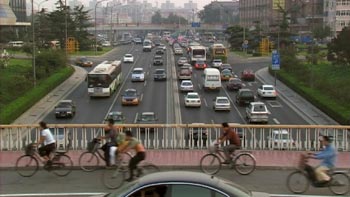
"This generation will be running China in a few years. They are the next international politicians and business leaders, and their choices will affect us all," says FRONTLINE producer Sue Williams about the new generation shaping China's future. In Young & Restless in China, FRONTLINE presents intimate portraits of nine young Chinese over the course of four years, examining the reality of their lives as they navigate their way through a country that is changing daily.
These young Chinese are Westernized, savvy about today's interconnected world, ambitious -- and often torn between their culture and their aspirations. Set to an original soundtrack of Chinese rock and hip-hop music, this provocative film presents an in-depth look at what it means to be young and Chinese today.
In a country once dominated by Maoism, Williams found that many young adults in China today want to grab new opportunities as fast as they can. "I work every single day. I'm spending my savings. I'm dripping my blood," says Lu Dong, a 32-year-old businessman launching his own Internet-based tailoring company. "I can only say, it feels like riding a roller coaster."
Miranda Hong, a successful marketing executive who graduated from a top business school, agrees. "My generation is confused," she says. "When I was a child, we needed ration tickets to buy things, like fabric and oil. Since the 1990s, it's a totally different world."
Even the most successful Chinese struggle with their nation's freewheeling economy. Businessman Xu Weimin is navigating the tough realities of doing business in China as he builds a hotel from the ground up. "Dealing with [local officials] is a process where you turn yourself from a total stranger into an acquaintance or close friend," Xu says. "During that process you definitely have to spend money."
Ben Wu, a successful Internet café entrepreneur who also works for a major multinational, recognizes the pressure to bribe local officials, too. "It's against my moral standards," he tells FRONTLINE. "Every day I have to make a choice, how far I want to go. You know, the thing I'm really afraid of is, down the road, I will no longer have this struggle every day."
Medical resident Zhang Yao sees another side of the new economy, as he tries to provide health care to a public of whom 70 percent are uninsured. His clinic is often overwhelmed with patients, but he still maintains his idealism: "As a doctor in a very large hospital, I feel an obligation to do public health work."
In Beijing, China's capital, the countdown to the 2008 Olympic Games is under way. Zhang Jingjing, a public interest lawyer, is representing more than 1,000 families over a power line built for the Olympics. "There was no environmental appraisal before it was built," Zhang tells FRONTLINE. "That's required by law." She is concerned that many officials may think that because she is suing the government, she must oppose it. "So far we haven't had any direct threats. But when I go to a small city or county seat to represent poor villagers, I can feel that I'm not welcome."
Rapper Wang Xiaolei also lives in the city, and his music, which is part of the film's soundtrack, often expresses a dark view of China's new economic boom. "There's actually a lot of discrimination in China," Wang says. "If you don't have money, people will look down on you." Over the course of the years that Williams was filming, Wang meets a girl on a social networking Web site. He sends her all his money to come visit him and is crushed when she doesn't appear.
Others in the film come from the countryside, where more than half of China's population still lives. Options for young people in rural China are so limited that few choose to stay. "I always thought I'd spend all my life in my village," says Wei Zhanyan, a migrant worker making cell phones in an industrial park. She loves her new freedom, which may be short-lived: Wei's family expects her to return home and marry a man they found through a matchmaker.
Yang Haiyan is also tied to her home village in rural Guangxi province, although she, too, migrated for work. She comes back often to help her father work his land and harvest the rice. "People in the outside world have food because we farmers work hard to grow rice," she says proudly. In one of the film's most affecting scenes, Yang travels 1,000 miles to connect with her mother, who was kidnapped and sold as a "wife" years before.
FRONTLINE follows Haiyan and the other characters as they struggle to find their paths in the nation's booming economy and confront the opportunities and challenges of modernity. As China prepares for its global "coming-out" party at the Olympics, the characters' lives highlight themes of capitalism, nationalism, identity and globalization that are creating the new China.
"For Americans, Chinese culture and society can seem different and confusing," Williams says. "I hope the people we profile in Young & Restless in China give a human face to China's astonishing social and economic transformation, showing Americans how much we and the Chinese have in common."




